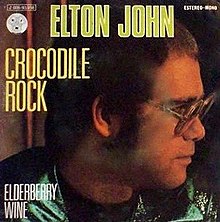Elderberry Wine (Elton John song)
| "Elderberry Wine" | ||||
|---|---|---|---|---|
 |
||||
| Single by Elton John | ||||
| from the album Don't Shoot Me I'm Only the Piano Player | ||||
| B-side | "Crocodile Rock" | |||
| Released |
|
|||
| Recorded | June 1972, Château d'Hérouville, France |
|||
| Genre | Rock | |||
| Length | 3:33 | |||
| Label |
MCA (US) DJM (UK) |
|||
| Writer(s) | Elton John, Bernie Taupin | |||
| Producer(s) | Gus Dudgeon | |||
| Elton John singles chronology | ||||
|
||||
"Elderberry Wine" is a song written by Bernie Taupin and Elton John that was first released on John's 1973 album Don't Shoot Me I'm Only the Piano Player. It was also released as the B-side of John's #1 hit "Crocodile Rock" in October 1972. It was also popular on album-oriented rock radio stations. John played it live during his 1973 tour. It was covered by singer Irish-Scots Mae McKenna.
"Elderberry Wine"'s music evokes nostalgia, and it has been described as a "retro rocker."Allmusic critic Stewart Mason describes it as a "straight-ahead piano-pounding rocker with gruff vocals and funky sax breaks," although Mason states that the song lacks the "retro trappings" of "Crocodile Rock." The instrumentation includes a brass instrument parts arranged by producer Gus Dudgeon and played by the horn players who also appeared on John's prior album Honky Chateau. Author Joseph Murrells suggests that the song has "a new rhythmic sound."
The lyrics are told by a man whose wife has left him. He misses her and recalls his happy days with her, but he mostly misses the fact that she was the one who could make the elderberry wine he used to enjoy with her. Mason suggests that the lyrics are "tongue in cheek silliness," and he considers the couplet:
the worst of Taupin's career. Author Elizabeth Rosenthal points out the irony in the fact that the happy music is juxtaposed against lyrics about loneliness. She notes that this method of using music that sounds the opposite of the meaning of the words is a technique John used often on his prior album Honky Chateau. She also sees in this song a development in this technique from earlier songs that would continue through "All the Girls Love Alice" to the fully mature "Love Lies Bleeding."
...
Wikipedia
